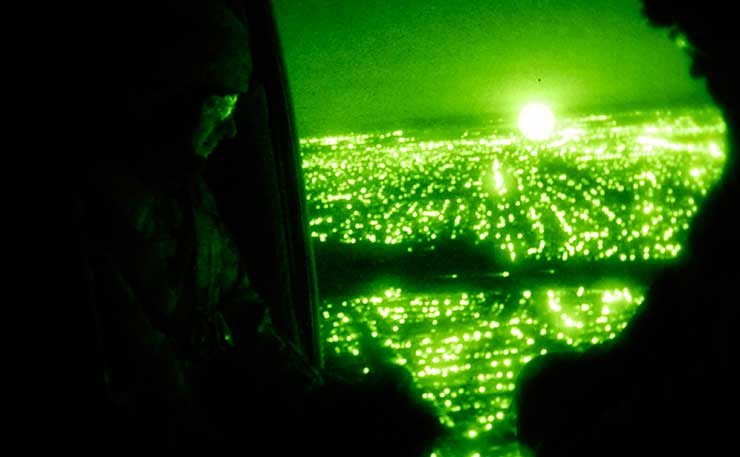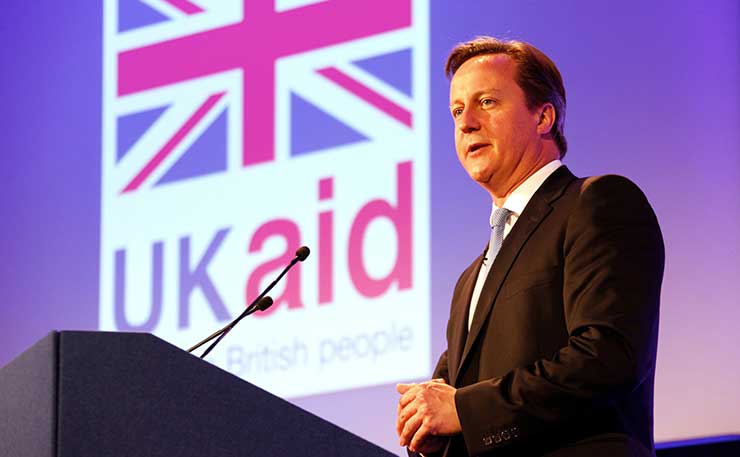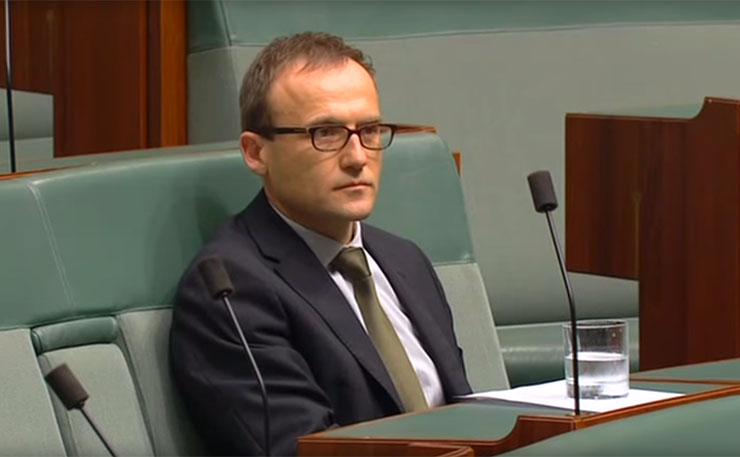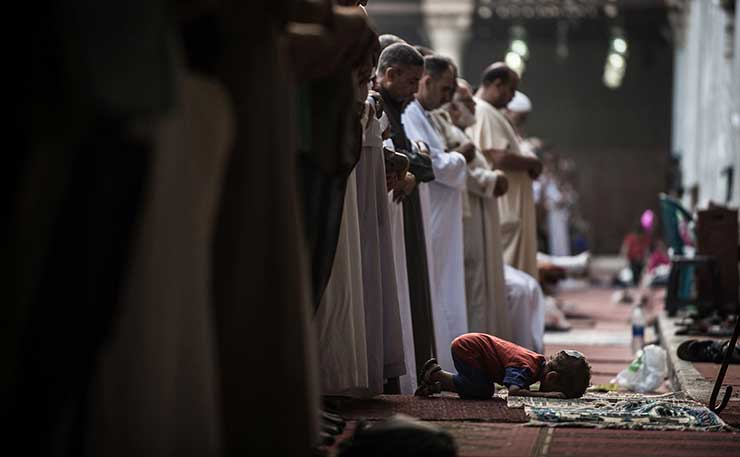Australia’s indifference to the suffering of Muslims in Libya – a suffering we helped inflict – speaks more for our nation’s hatred of Muslims than any hate-speech Pauline Hanson has ever uttered, writes Michael Brull.
At the time of writing, somewhere between 21 per cent and 51 per cent of Australians are in shock at the other 49 per cent who support a ban on Muslim immigration. Though some may attribute this to the rise of Pauline Hanson, who has been helped immensely by media and political elites, the fact is that demonisation of Muslims in political discourse has been utterly pervasive for years.
Yet as routine as such vitriol against Muslims has been, it has not been accompanied by the social media outrage we expect when other groups have been targeted.
Even an article justifying vigilantes taking up arms against Muslims didn’t provoke any meaningful backlash.
Yet Australian hostility to Muslims is not just demonstrated in anti-Muslim comments and prejudices. The most sinister sign of the depths of anti-Muslim sentiment is the complete lack of regard for Muslim life in Australia.
Since 2001, we have gone to war in Syria, Afghanistan, Libya, and twice in Iraq. None of these wars has been anything like a success. The first war on Iraq was such a disaster that we’ve wound up re-invading it, and also launched a new war on Syria.

Already that new war is proving disastrous, as it is possible that Australia was involved in an airstrike that may unravel the hard-fought ceasefire negotiated between Russia and the US.
Yet despite all the lives lost, people displaced, and countries destroyed, there has been virtually no debate, no soul searching, and no accountability. Political leaders are not judged on their contribution to the destruction of Muslim countries. Where Americans passionately follow their wars, and evaluate their leaders on these issues, in Australia, we don’t even care.
Australia joins in one war after another, and the media yawns. There is hardly even a pretence of debate on our wars, let alone meaningful debate and scrutiny. Thus, for our war on Syria, the ALP rejected parliamentary discussion on the war, but simply requested “regular updates” from the Coalition.
Recently, the UK Parliament published a scathing report on the war on Libya. It refutes the humanitarian pretext on which the war was fought, arguing that claims of an impending massacre were inflated and based on a selective reading of Qaddafi’s rhetoric. It criticises Western media for its “one-sided” reporting on the war, and notes that “hindsight” was not needed to note the extremist nature of the rebels the West supported.
It observes the evidence that the intervention was driven by France’s pursuit of political interest, such as gaining a “greater share of Libya oil production”, increasing “French influence in North Africa”, and improving the French President’s “internal political situation in France”.

The summary alone is devastating for supporters of the war. It says that the war was supposed to protect civilians, but shifted to an “opportunist policy of regime change.”
The government “failed to identify that the threat to civilians was overstated”, or that “the rebels included a significant Islamist element”. The policy of regime change didn’t include a “strategy to support and shape post-Gaddafi Libya”. The “result was political and economic collapse, inter-militia and inter-tribal warfare, humanitarian and migrant crises, widespread human rights violations, the spread of Gaddafi regime weapons across the region and the growth of ISIL in North Africa”. Pinning blame right at the top, it says that “former Prime Minister David Cameron was ultimately responsible for the failure to develop a coherent Libya strategy”.
The report refutes the basis of the supposedly humanitarian intervention, arguing that the evidence did not support claims that Qaddafi was about to commit a massacre. In analysis that should provoke a feeling of déjà vu, it found that “émigrés opposed to Muammar Gaddafi exploited unrest in Libya by overstating the threat to civilians and encouraging Western powers to intervene”. It notes an Amnesty investigation which found that “much Western media coverage has from the outset presented a very one-sided view of the logic of events, portraying the protest movement as entirely peaceful and repeatedly suggesting that the regime’s security forces were unaccountably massacring unarmed demonstrators who presented no security challenge”.

Ultimately, they saw “no evidence that the UK Government carried out a proper analysis of the nature of the rebellion in Libya…. It could not verify the actual threat to civilians posed by the Gaddafi regime; it selectively took elements of Muammar Gaddafi’s rhetoric at face value; and it failed to identify the militant Islamist extremist element in the rebellion. UK strategy was founded on erroneous assumptions and an incomplete understanding of the evidence”. The report concluded that: “In short, the scale of the threat to civilians was presented with unjustified certainty.”
As for the nature of the rebellion: “The possibility that militant extremist groups would attempt to benefit from the rebellion should not have been the preserve of hindsight. Libyan connections with transnational militant extremist groups were known before 2011, because many Libyans had participated in the Iraq insurgency and in Afghanistan with al-Qaeda.”
The report discusses the changing basis for the war on Libya. It records that “When the then Prime Minister David Cameron sought and received parliamentary approval for military intervention in Libya on 21 March 2011, he assured the House of Commons that the object of the intervention was not regime change.” However, in April 2011, “he signed a joint letter with United States President Barack Obama and French President Nicolas Sarkozy setting out their collective pursuit of “a future without Gaddafi’.”

The report’s discussion on how the war came about is also significant. It notes that “the political momentum to propose Resolution 1973 began in France”. Though the French government claimed the situation was particularly urgent (“We have very little time left — perhaps only a matter of hours”), “subsequent analysis suggested that the immediate threat to civilians was being publicly overstated”. The report notes with understatement that “other factors in addition to civilian protection appeared to influence French policy”. In particular, it includes discussion of emails to Hillary Clinton obtained in a Freedom of Information Request.
In an email from April 2, 2011, “Sidney Blumenthal, adviser and unofficial intelligence analyst to the then United States Secretary of State Hillary Clinton, reported this conversation with French intelligence officers to the Secretary of State”.
The email read as follows:
“According to these individuals Sarkozy’s plans are driven by the following issues:
- A desire to gain a greater share of Libya oil production,
- Increase French influence in North Africa,
- Improve his internal political situation in France,
- Provide the French military with an opportunity to reassert its position in the world,
- Address the concern of his advisors over Qaddafi’s long term plans to supplant France as the dominant power in Francophone Africa.”
The report comments that, “The sum of four of the five factors identified by Sidney Blumenthal equated to the French national interest. The fifth factor was President Sarkozy’s political self-interest.”
According to the report, the UK was the second country after France to call for a no-fly Zone. Then the US got involved, and “was instrumental in extending the terms of Resolution 1973 beyond the imposition of a no-fly zone to include the authorisation of ‘all necessary measures’ to protect civilians. In practice, this led to the imposition of a ‘no-drive zone’ and the assumed authority to attack the entire Libyan Government command and communications network.”
As Australia joined in the war, and has been involved in several other wars on Muslim countries, one might think that the report’s devastating analysis would provoke some discussion, and perhaps even some soul-searching. But it hasn’t.
The politicians who supported the war, and the pundits who advocated for it, apparently don’t even notice these things.

The war has had horrendous consequences, and its pretexts have dismantled, and yet it counts for nothing. A country lies devastated, with a collapsed economy, no government, and the menace of ISIS rising and spreading.
Whilst Pauline Hanson says many appalling things about Muslims, it was not just the far-right who promoted yet another war on a Muslim country. It was most of the political spectrum. You can read more about that here, in a New Matilda article published earlier this week.
These people – including significant figures of the Australian left, supported the destruction of a Muslim country, and then walked away, utterly indifferent to the catastrophe they helped create.
And whilst there is at least some debate over the offensive things Hanson has said about Muslims, there is virtually none over what Australia has done to Muslims.
Saying overtly bigoted things about Muslims still offends some Australians. Destroying Muslim countries, however, is firmly within the tent.
That is the true index of Australian Islamophobia: the utterly mainstream contempt for Muslim lives.
Donate To New Matilda
New Matilda is a small, independent media outlet. We survive through reader contributions, and never losing a lawsuit. If you got something from this article, giving something back helps us to continue speaking truth to power. Every little bit counts.





